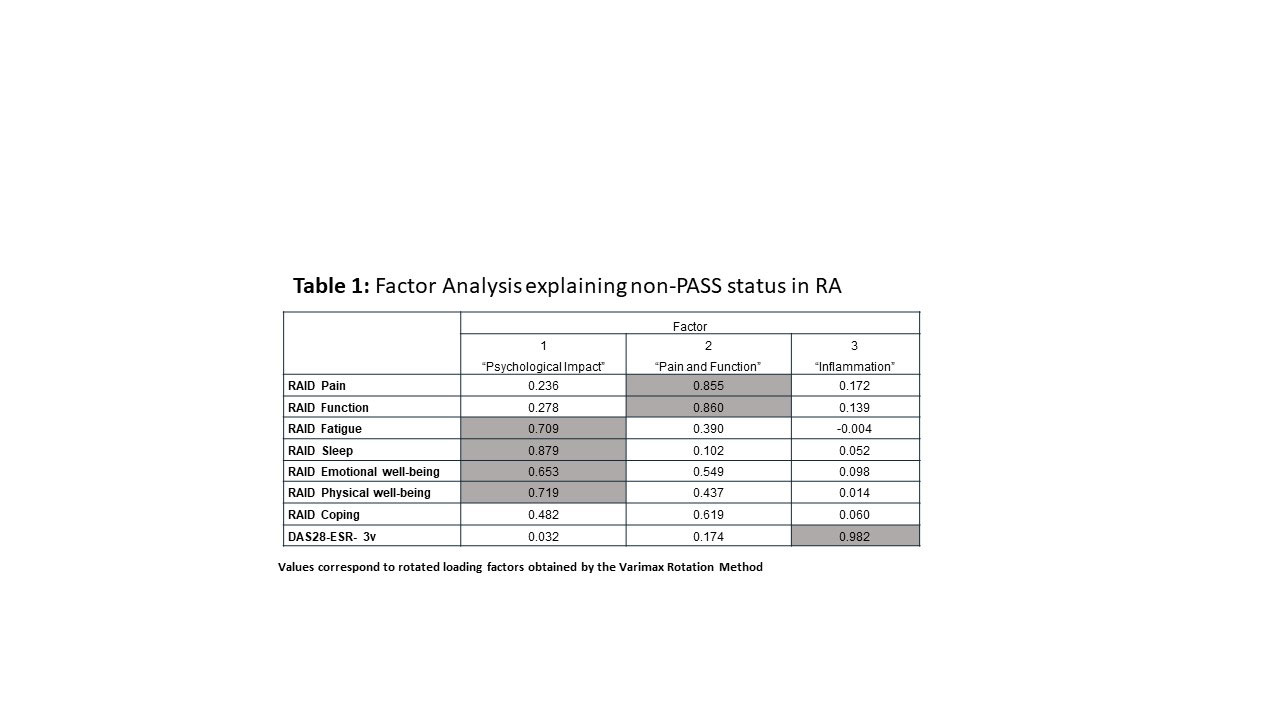Session Information
Date: Sunday, November 10, 2019
Title: RA – Diagnosis, Manifestations, & Outcomes Poster I: Risk Factors, Predictors, & Prognosis
Session Type: Poster Session (Sunday)
Session Time: 9:00AM-11:00AM
Background/Purpose: Patient Acceptable Symptom State (PASS) represents the maximum level of symptom intensity that a patient considers acceptable. Control of disease activity is associated with the attainment of PASS, but many patients do not reach this status despite being in disease remission. Recognizing the factors associated with PASS status can be helpful in identifying the need for adjunctive treatments besides immunosuppressive therapy, aiming at improving the satisfaction and well-being of patients with rheumatoid arthritis (RA). This study aimed to explore domains of health associated with being in non-PASS in RA patients.
Methods: Data of patients with a diagnosis of RA from 3 databases (NOR-DMARD, RAID study and RAID.Pt) were included. PASS was assessed using the anchored method based on patients’ perspective, through the question: “Think about all the ways your RA has affected you during the last week. If you were to remain for the next few months as you were during the last week, would this be a) Acceptable b) Unacceptable”. Age, gender, disease duration, disease activity based on DAS28-3 variable (joint counts and ESR) and its individual components, the RA Impact of Disease (RAID) score and its individual components, Patient Global Assessment (PGA) and Physician Global Assessment (PHGA) were collected. Patients who considered themselves in a non-acceptable status and without missing data were selected for statistical analysis. An exploratory factor analysis using the principal components method and Varimax rotation with Kaiser Normalization was performed. A correlation analysis (Pearson’s correlation) between the identified factors with PGA and PhGA was performed.
Results: In total, 643 RA patients in non-acceptable status from the three datasets (NOR-DMARD: 388; RAID Study: 179 and RAID.Pt: 76) were included (female: 79.6%, mean age (±SD): 54.0±15.2 years; mean disease duration: 13.4±1.5 years). On average, patients in non-PASS status scored ≥ to 5 in all RAID domains, except Coping (mean:4.79±2.33) and had moderate disease activity (mean DAS28-ESR-3v: 3.77±1.46). Three principal components were identified: “Psychological Impact”, “Pain and Function”, and “Inflammation” explaining respectively 32.3%, 31.7%, and 12.9% of the total variance (table 1). PGA was moderately correlated with ”Psychological Component” (r= 0.43) and with “Pain and Function Component” (r=0.68), but not with the “Inflammation Component”. Conversely, PhGA correlated moderately with the “Inflammation component” (r=0.55), but not with the other two factors.
Conclusion: This exploratory analysis suggested that non-PASS status can be due to three main factors: “Psychological impact”, “Pain and Function and Inflammation. This suggests the need for a holistic evaluation and consideration of tailored interventions to optimize outcomes, from the patients’ perspective.
To cite this abstract in AMA style:
Duarte C, Santos E, Kristianslund E, Heiberg T, de Wit M, Dougados M, Kvien T, Gossec L, Pereira da Silva J. Inflammation but Also Pain and Function, and Psychological Impact Is Related to Non-Acceptable Status in Patients with Rheumatoid Arthritis: A Factorial Analysis in 643 Patients [abstract]. Arthritis Rheumatol. 2019; 71 (suppl 10). https://acrabstracts.org/abstract/inflammation-but-also-pain-and-function-and-psychological-impact-is-related-to-non-acceptable-status-in-patients-with-rheumatoid-arthritis-a-factorial-analysis-in-643-patients/. Accessed .« Back to 2019 ACR/ARP Annual Meeting
ACR Meeting Abstracts - https://acrabstracts.org/abstract/inflammation-but-also-pain-and-function-and-psychological-impact-is-related-to-non-acceptable-status-in-patients-with-rheumatoid-arthritis-a-factorial-analysis-in-643-patients/

